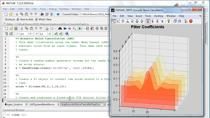Sensor Fusion and Tracking with MATLAB
Overview
Sensor fusion algorithms can be used to improve the quality of position, orientation, and pose estimates obtained from individual sensors by combing the outputs from multiple sensors to improve accuracy. By fusing data from multiple sensors, the strengths of each sensor modality can be used to make up for shortcomings in the other sensors. In addition, systems that perform sense and perception need to keep track of a very large number of objects to maintain complete situational awareness.
In this webinar, you will learn about algorithms and tools to design, simulate, and analyze systems that fuse data from multiple sensors to maintain position, orientation, and situational awareness. The webinar will include several reference examples that provide a starting point for airborne, ground-based, shipborne, and underwater sensing systems.
Highlights
Through several examples, we will:
- Create multi-object trackers and sensor fusion filters
- Generate synthetic detection data for radar, EO/IR, sonar, and RWR sensors, along with GPS/IMU sensors for localization
- Design data association algorithms for real and synthetic data
- Define and import scenarios and trajectories for simulation
- Evaluate system accuracy and performance with standard benchmarks, metrics, and animated plots
About the Presenter
Rick Gentile works at MathWorks where he is focused on tools that support radar, EW, and wireless communications applications. Prior to joining MathWorks, Rick was a Radar Systems Engineer at MITRE and MIT Lincoln Laboratory, where he worked on the development of many large radar systems. His focus was on signal processing and system integration. Rick also was a DSP Applications Engineer at Analog Devices where he led embedded processor and system level architecture definitions for high performance signal processing systems. He received a B.S. in Electrical and Computer Engineering from the University of Massachusetts, Amherst and an M.S. in Electrical and Computer Engineering from Northeastern University, where his focus areas of study included Microwave Engineering, Communications and Signal Processing.
Recorded: 23 May 2019




